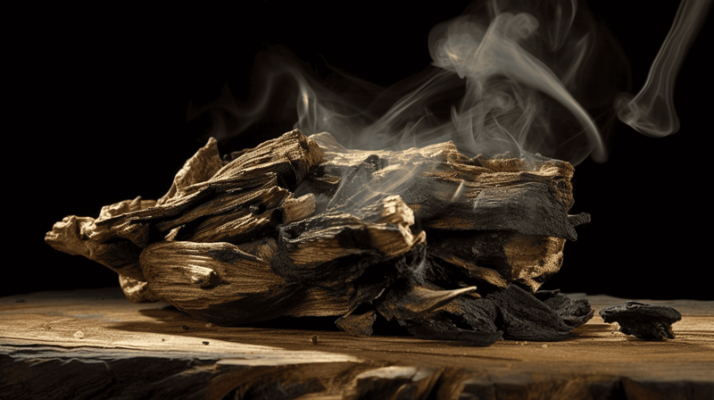There are thousands of tree species in the world, there are millions of floral scents from Herbs, but throughout the length of history transcending all time and the depth of spiritual culture with all religions and beliefs. So what is the meaning of Agarwood in Buddhism? Let’s find out with Oud House in this article.
The meaning of Agarwood in Buddhism
In the culture and rituals of Buddhism: Since ancient times, the meaning of Agarwood is shown in Agarwood (pieces or powder) that has been used to burn when meditating, chanting and in almost every other sacred ritual. Some Buddhist texts mention the use of aromas in religious ceremonies. For example:
In the Jātaka

A collection of rich literary works about Buddha’s previous lives (around the 4th century BC), the meaning of Agarwood is mentioned in book VI number 542. This text portrays women’s use of perfume in a story about a king who attempts to enter the world of the gods through the ritual sacrifice of his most valuable possessions, including his own family.
To prepare for the ceremony, the princes were brought to the altar; there, the royal ladies and other women of the capital carrying on their bodies “agarwood, sandalwood, precious stones and silk and brocade” bowed to their son(s) Canda Suriya one last time before conduct the king’s sacrificial ceremony. Both agarwood and sandalwood, combined with other valuable items, are used as signs of reverence and have been used as precious scented products since ancient times.
In the Mahaparinirvana Sutra – agarwood in Buddhism
The meaning of Agarwood represents the use of spices mentioned in the opening chapter, describing a series of events that occurred as Buddha entered Nirvana. One description mentions the use of fragrant wood to cremate Tathagata’s body: “people held in their hands tens of thousands of bundles of fragrant wood such as sandalwood and agarwood.” Agarwood is also used as firewood when lighting the stove to cook for Buddha and the Sangha.
In the Story of the Devas (Vimānavatthu)
Collection of 85 meanings of Agarwood expressed in poems about the happiness of those who are reborn in heaven and about the good deeds that lead to this worthy reward, there are some references to the use of perfume.
In poem 35 (7) – Agarwood in Buddhism
The meaning of Agarwood is shown in Sesavati’s Heavenly Palace (Sesavatīvimāna), during the funeral of the Venerable Sāriputta, agarwood, sandalwood, and similar woods were part of the funeral pyre several hundred cubits high. The 5 natural fragrance products represent the speeches of the 5 Buddhas, including sandalwood, agarwood, turpentine or juniper, camphor and vetiver root.
According to the Lotus Sutra (Chapter 19 – Meritorious Dharma Master)

Any good man or good woman who accepts and upholds the Lotus Sutra, reads it, recites it, explains it, or writes it down will receive eight hundred merits from his nose and be able to use his senses to be pure. Smell all over the three thousand great thousand realms and enjoy the scents of Heaven, especially the scent of Agarwood.
In Monks and Buddhists – Agarwood in Buddhism
Agarwood carries meanings and energies similar to Buddhist principles. Monks and Buddhists all over the world also use 108-beaded Agarwood strings (rosary beads) when chanting Buddha’s name. The concept is that when a rosary made of Agarwood is warmed by body temperature, the Agarwood rosary emits an elegant scent that helps people calm down and relax. The scent of agarwood has a sedative effect, improving the ability to concentrate, lucidity, and concentration. It is often used in meditation, helping the mind to be steadfast and relaxed, thereby it drives away evil thoughts and demons because the meaning of Agarwood is to exorcism evil spirits and reduce stress.
Meaning of Agarwood in Hinduism

In Hinduism, agarwood is the smell of god Krishna – the incarnation of love, representing human knowledge.
The Sanskrit epic Mahābhārata (covering the period 1493-1443 BC in Indian history) describes the use of perfume for the purposes of luxury, enjoyment and human well-being. In this literature, the meaning of Agarwood is often an expression of wealth, an honor, or a greeting. In the first book of the Mahābhārata, the people of the ancient city of Khandavaprastha welcomed distant guests (Madhava and other tribal clans) by filling the whole city “with the sweet fragrance of burning agarwood.”
Conclusion
There are about 7 countries in Southeast Asia that have agarwood, but nowhere is there as much agarwood and quality as in Vietnam. Not only that, Vietnamese Agarwood is considered the best in the world even in fastidious countries such as the United Arab Emirates (Dubai), Northeast Asia… people already know the value of Vietnamese Agarwood. Currently, at the Japanese Imperial Palace, a block of jasmine originating from Vietnam is being displayed and is considered a national treasure.
The article covers all information about the meaning of agarwood in Buddhism and Hinduism. Hope this will provide valuable information for you who are curious about agarwood.
CONTACT US THROUGH OUR HOTLINE NOW FOR FREE COUNSELING
OUD HOUSE | VIETNAM FRANKINCENSE
Contact us: +84 866 033 099
Email: oudhouse.tiger@gmail.com
معنى العود في البوذية والهندوسية
هناك الآلاف من أنواع الأشجار في العالم، وهناك الملايين من روائح الزهور من الأعشاب، ولكن على مر التاريخ تجاوزت كل العصور وعمق الثقافة الروحية مع جميع الأديان والمعتقدات. إذن ما هو معنى العود في البوذية؟ دعنا نكتشف ذلك مع بيت العود في هذا المقال.
معنى العود في البوذية
في ثقافة وطقوس البوذية: منذ العصور القديمة، يظهر معنى العود في خشب العود (قطع أو مسحوق) الذي تم استخدامه للحرق عند التأمل والترديد وفي كل الطقوس المقدسة الأخرى تقريبًا. تذكر بعض النصوص البوذية استخدام الروائح في الاحتفالات الدينية. على سبيل المثال:
في جاتاكا
مجموعة من الأعمال الأدبية الغنية عن حياة بوذا السابقة (حوالي القرن الرابع قبل الميلاد)، وقد ورد ذكر معنى العود في الكتاب السادس رقم 542. ويصور هذا النص استخدام النساء للعطور في قصة عن ملك يحاول دخول عالم الآلهة من خلال طقوس التضحية بأثمن ممتلكاته، بما في ذلك عائلته.
للتحضير للحفل، تم إحضار الأمراء إلى المذبح؛ هناك، انحنت السيدات الملكيات ونساء العاصمة الأخريات اللاتي يحملن على أجسادهن “خشب العود وخشب الصندل والأحجار الكريمة والحرير والديباج” لابنهن (أبنائهن) كاندا سوريا مرة أخيرة قبل إجراء مراسم قربان الملك. يتم استخدام كل من خشب العود وخشب الصندل، جنبًا إلى جنب مع العناصر الثمينة الأخرى، كعلامات تقديس، وقد تم استخدامهما كمنتجات عطرية ثمينة منذ العصور القديمة.
في ماهابارينيرفانا سوترا – العود في البوذية
يمثل معنى العود استخدام التوابل المذكورة في الفصل الافتتاحي، الذي يصف سلسلة من الأحداث التي حدثت عندما دخل بوذا إلى النيرفانا. يذكر أحد الأوصاف استخدام الخشب العطري لحرق جثة تاثاغاتا: “كان الناس يحملون في أيديهم عشرات الآلاف من حزم الأخشاب العطرية مثل خشب الصندل وخشب العود”. يُستخدم خشب العود أيضًا كحطب عند إشعال الموقد لطهي الطعام لبوذا والسانغا.
في قصة الديفاس (فيمانافاتو)
مجموعة مكونة من 85 معاني لخشب العود تم التعبير عنها في قصائد عن سعادة المولودين من جديد في الجنة وعن الأعمال الصالحة التي تؤدي إلى هذه المكافأة القيمة، وهناك بعض الإشارات إلى استخدام العطور.
في القصيدة 35 (7) – العود في البوذية
يظهر معنى خشب العود في قصر سيسافاتي السماوي (Sesavatīvimāna)، خلال جنازة ساريبوتا المبجل، وكان خشب العود وخشب الصندل والأخشاب المماثلة جزءًا من المحرقة الجنائزية التي يبلغ ارتفاعها عدة مئات من الأذرع. تمثل منتجات العطور الطبيعية الخمسة خطابات بوذا الخمسة، بما في ذلك خشب الصندل وخشب العود وزيت التربنتين أو العرعر والكافور وجذور نجيل الهند.
وفقًا لـ Lotus Sutra (الفصل 19 – سيد دارما الجدير بالتقدير)
أي رجل صالح أو امرأة صالحة يقبل ويؤيد لوتس سوترا، أو يقرأها، أو يقرأها، أو يشرحها، أو يكتبها، سيحصل على ثمانمائة ميزة من أنفه وسيكون قادرًا على استخدام حواسه ليكون نقيًا. استمتع بالرائحة في جميع أنحاء الثلاثة آلاف من العوالم واستمتع برائحة الجنة، وخاصة رائحة خشب العود.
عند الرهبان والبوذيين – العود في البوذية
يحمل العود معاني وطاقات مشابهة للمبادئ البوذية. يستخدم الرهبان والبوذيون في جميع أنحاء العالم أيضًا خيوط العود المكونة من 108 خرزات (خرز المسبحة) عند ترديد اسم بوذا. المفهوم هو أنه عندما يتم تسخين مسبحة مصنوعة من خشب العود بواسطة درجة حرارة الجسم، فإن مسبحة خشب العود تنبعث منها رائحة أنيقة تساعد الناس على الهدوء والاسترخاء. رائحة خشب العود لها تأثير مهدئ، مما يحسن القدرة على التركيز والوضوح والتركيز. غالبًا ما يستخدم في التأمل، مما يساعد العقل على الثبات والاسترخاء، وبالتالي يطرد الأفكار الشريرة والشياطين لأن معنى العود هو طرد الأرواح الشريرة وتقليل التوتر.
معنى العود في الهندوسية
خاتمة
هناك حوالي 7 دول في جنوب شرق آسيا لديها خشب العود، ولكن لا يوجد في أي مكان نفس القدر من خشب العود والجودة كما هو الحال في فيتنام. ليس هذا فقط، يعتبر العود الفيتنامي هو الأفضل في العالم حتى في البلدان الصعبة مثل الإمارات العربية المتحدة (دبي)، وشمال شرق آسيا… فالناس يعرفون بالفعل قيمة العود الفيتنامي. وحالياً، يتم عرض في القصر الإمبراطوري الياباني كتلة من الياسمين مصدرها فيتنام وتعتبر كنزاً وطنياً.
يغطي المقال جميع المعلومات حول معنى العود في البوذية والهندوسية. نأمل أن يوفر هذا معلومات قيمة لمن لديهم فضول بشأن العود.
اتصل بنا عبر خطنا الساخن الآن للحصول على استشارات مجانية
بيت العود | اللبان الفيتنامي
اتصل بنا: +84 866 033 099
البريد الإلكتروني: oudhouse.tiger@gmail.com





